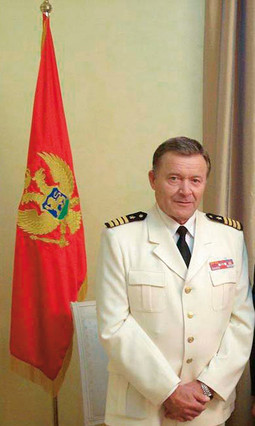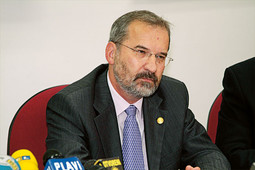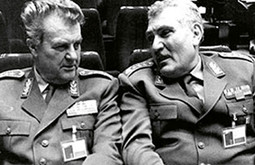Published in Nacional number 628, 2007-11-26
SECRET INTERPOL ARREST WARRANTS
Bajic's greatest weapon against war criminals
ABOUT A THOUSAND SECRET ARREST WARRANTS threaten the members of the Serbian paramilitary that committed war crimes in Croatia
 Montenegrin combat ship captain Ilija Brcic was arrested at the Rome Airport when he arrived as a member of an official delegationThe recent arrests of Serbians indicted of war crimes committed on Croatian territory, Goran Pavic in the United States of America and Montenegrin naval Captain Ilija Brcic in Italy based on secret Interpol arrest warrants issued by the Croatian interior ministry has caused panic among former Krajina warlords, officials of the former Serbian pseudo-state on Croatian territory and among former Yugoslav Army (JNA) officers. The operation spearheaded by the Croatian State Attorney's Office in collaboration with Croatian Police to get to those indicted of war crimes committed in Croatia by way of secret international arrest warrants has been yielded good results for some time now.
Montenegrin combat ship captain Ilija Brcic was arrested at the Rome Airport when he arrived as a member of an official delegationThe recent arrests of Serbians indicted of war crimes committed on Croatian territory, Goran Pavic in the United States of America and Montenegrin naval Captain Ilija Brcic in Italy based on secret Interpol arrest warrants issued by the Croatian interior ministry has caused panic among former Krajina warlords, officials of the former Serbian pseudo-state on Croatian territory and among former Yugoslav Army (JNA) officers. The operation spearheaded by the Croatian State Attorney's Office in collaboration with Croatian Police to get to those indicted of war crimes committed in Croatia by way of secret international arrest warrants has been yielded good results for some time now.
It has been demonstrated that secret international arrest warrants are the only effective means that Croatia can use in order to bring to trail war crimes committed on its territory by the Serb paramilitary. If this were not the case, all those who committed these crimes or approved of them could freely walk any part of the globe without fear of answering for their wrongdoing, because their countries of origin, Serbia and Montenegro, and the Republika Srpska in Bosnia & Herzegovina are doing nothing or very little in taking over these cases to be brought to trial on their territory. The model by which Croatia is getting to those indicted for war crimes needs not cause fear among those who did not participate in pillaging, massacres, torture and the abuse of Croatian civilians and soldiers. Croatia has given an amnesty to all members of the Krajina militia, and some of them are now employed in the Croatian Police. With the strengthening of Croatia's international standing and the imminent accession to Euro-Atlantic associations, the increasingly successful battle against organised crime, especially the significant successes in collaboration with Interpol in cracking the narcotics markets and supply routes, has won Croatia a good reputation among Interpol members, especially the countries of the immediate neighbourhood. As a result of all this other countries too are more seriously working on Croatian requests when it comes to international arrest warrants of those indicted for war crimes. This was especially evident after all of the Croatian generals accused by the Hague tribunal for war crimes were extradited, i.e. when Croatia met all of its obligations towards the International criminal tribunal in The Hague. It can be said that Austria, Germany, Switzerland and the USA are countries with which Croatia has thus far best cooperated while the greatest problem is with Great Britain which is very reluctant to extradite sought indictees and where the extradition procedure is very long.
 MLADEN BAJIC, Croatian State AttorneyFrom 1991 to the present procedures for war crimes have been initiated against 3,604 persons who took part in the aggression against Croatia during the Homeland War. The investigations into 1,381 persons have been closed because evidence had not been collected during the investigation procedure that these persons directly ordered or committed war crimes. 1,441 persons have been charged to date of which 593 have been convicted and 292 found not guilty. Nacional has learned that it is true that there are a further about 1,000 Serbian war crime indictees on Interpol arrest warrants, most of which have been convicted in absentia.
MLADEN BAJIC, Croatian State AttorneyFrom 1991 to the present procedures for war crimes have been initiated against 3,604 persons who took part in the aggression against Croatia during the Homeland War. The investigations into 1,381 persons have been closed because evidence had not been collected during the investigation procedure that these persons directly ordered or committed war crimes. 1,441 persons have been charged to date of which 593 have been convicted and 292 found not guilty. Nacional has learned that it is true that there are a further about 1,000 Serbian war crime indictees on Interpol arrest warrants, most of which have been convicted in absentia.
Just how important some of the arrests of the indictees on the international arrest warrants are to relations between countries is demonstrated by the recent case of the arrest in Italy of Montenegrin naval Captain Ilija Brcic, Montenegrin President Filip Vujanovic asked Croatian President Stjepan Mesic, during their meeting of 23 November 2007 at a regional economic forum held in Dubrovnik, that the retrial of Montenegrin army officer Ilija Brcic, convicted in Croatia for the shelling of Split, be held in Montenegro, and that Brcic be allowed to defend himself at liberty.
 Arrest warrants have been issued against Veljko Kadijevic and Blagoje Adzic, former commanders of the Yugoslav Army for war crimes committed in Vukovar and Eastern Slavonia at the beginning of the Homeland WarCustoms control points and border crossings, airports and seaports around the world are the places where so far, according to the information of the Croatian State Attorney's Office 36 persons accused of committing war crimes in Croatia have been arrested based on international warrant for their arrests. This is quite the opposite of Serbian claims that exaggerate the number and cite as many as 68 persons arrested based on international arrest warrants. Of the 36 indictees arrested based on international arrest warrants for war crimes, 13 have been convicted, three found guilty subject to appeal, a first-instance conviction has been confirmed for one, five indictees are in the phase of the main court hearing, proceedings against five have been postponed, the investigations against four have been closed or criminal charges have been dropped, two of the indictees have been found not guilty, and one has been found not guilty by a first-instance court. The proceedings against recently arrested Goran Pavic, taken into custody on 7 November 2007 when he was arrested by the US customs and border service while driving a semitrailer from Canada to the USA and had had his data had been entered into a computer, is in the phase of a formal indictment. The case of Momcilo Grbic, arrested on 29 May 2004 at the Jurovski Brod border crossing between Croatia and Slovenia ended with a ruling dismissing the charges. A good part of the proceedings against Serbs on international arrest warrants, about 50 percent of all cases, finish in their favour. Above all because of the fact that the detainees appeared before Croatian courts where they could present their defence and the circumstances of the events of which they are charged and in doing so shed light on many of the circumstances contentious for the court. Most of the attention of the press and of other countries was drawn by the arrests of indictees on international arrest warrants that took place outside of Croatia, which has happened in eighteen cases so far. Less attention was attracted by the arrests of indictees on Croatian territory. The example of the recent arrest of high-ranking Montenegrin officer Ilija Brcic is no the only case of the arrest of a person with diplomatic status or a member of an official state delegation. That also happened with Lieutenant Colonel of the Armed Forces of Serbia and Montenegro Cedomir Brankovic, arrested in Bulgaria in late April of 2005. Brankovic was in Bulgaria as a member of an official delegation of the Serbia and Montenegro Army and was arrested in Sofia, but released by a Bulgarian court with the explanation that he had diplomatic immunity.
Arrest warrants have been issued against Veljko Kadijevic and Blagoje Adzic, former commanders of the Yugoslav Army for war crimes committed in Vukovar and Eastern Slavonia at the beginning of the Homeland WarCustoms control points and border crossings, airports and seaports around the world are the places where so far, according to the information of the Croatian State Attorney's Office 36 persons accused of committing war crimes in Croatia have been arrested based on international warrant for their arrests. This is quite the opposite of Serbian claims that exaggerate the number and cite as many as 68 persons arrested based on international arrest warrants. Of the 36 indictees arrested based on international arrest warrants for war crimes, 13 have been convicted, three found guilty subject to appeal, a first-instance conviction has been confirmed for one, five indictees are in the phase of the main court hearing, proceedings against five have been postponed, the investigations against four have been closed or criminal charges have been dropped, two of the indictees have been found not guilty, and one has been found not guilty by a first-instance court. The proceedings against recently arrested Goran Pavic, taken into custody on 7 November 2007 when he was arrested by the US customs and border service while driving a semitrailer from Canada to the USA and had had his data had been entered into a computer, is in the phase of a formal indictment. The case of Momcilo Grbic, arrested on 29 May 2004 at the Jurovski Brod border crossing between Croatia and Slovenia ended with a ruling dismissing the charges. A good part of the proceedings against Serbs on international arrest warrants, about 50 percent of all cases, finish in their favour. Above all because of the fact that the detainees appeared before Croatian courts where they could present their defence and the circumstances of the events of which they are charged and in doing so shed light on many of the circumstances contentious for the court. Most of the attention of the press and of other countries was drawn by the arrests of indictees on international arrest warrants that took place outside of Croatia, which has happened in eighteen cases so far. Less attention was attracted by the arrests of indictees on Croatian territory. The example of the recent arrest of high-ranking Montenegrin officer Ilija Brcic is no the only case of the arrest of a person with diplomatic status or a member of an official state delegation. That also happened with Lieutenant Colonel of the Armed Forces of Serbia and Montenegro Cedomir Brankovic, arrested in Bulgaria in late April of 2005. Brankovic was in Bulgaria as a member of an official delegation of the Serbia and Montenegro Army and was arrested in Sofia, but released by a Bulgarian court with the explanation that he had diplomatic immunity.
 GORAN PAVIC, now a truck driver, was arrested at the US-Canadian borderHe is suspected of committing war crimes against civilians as the commander of JNA troops in August of 1991 in the Novska area, i.e. that he on 17 August 1991 commanded an armoured battalion of the JNA 265th motorised brigade and together with 31 other persons attacked 21 settlements in the Novska area. 13 civilians died in the attack.
GORAN PAVIC, now a truck driver, was arrested at the US-Canadian borderHe is suspected of committing war crimes against civilians as the commander of JNA troops in August of 1991 in the Novska area, i.e. that he on 17 August 1991 commanded an armoured battalion of the JNA 265th motorised brigade and together with 31 other persons attacked 21 settlements in the Novska area. 13 civilians died in the attack.
Besides the recent arrests in the USA, Great Britain and Italy of those indicted for war crimes and in previous years in Switzerland, Germany and Russia, one of the arrests that drew massive attention in recent years was that of former JNA pilot Emir Sisic. A pilot of the former Yugoslav Air Force, Emir Sisic on 7 January 1992 fired an air to air missile near Varazdin from the Mig-21 he had taken off from Bihac in and shot down an unarmed European Community helicopter, killing five, four Italians and a French national. Sisic was convicted in Croatia, in absentia, to 20 years in prison.
 MONTENEGRIN PRESIDENT Vujanovic (right) met with Mesic about Ilija BrcicAfter he was arrested in Hungary and deported to Italy, he was sentenced in Rome to 15 years in prison, and was transferred to Serbia to serve his prison term in Sremska Mitrovica after a long diplomatic haggle. Plenty of attention was drawn by the arrest of Zorana Banic in Switzerland in 2001 on the basis of an international arrest warrant. Before the Homeland War Zorana Banic worked as a nurse. She was indicted and then convicted for violating international law, i.e. for her participation in the attack and murder of the inhabitants of Skabrnja on 18 November 1991. She was initially convicted in absentia to 20 years in prison.
MONTENEGRIN PRESIDENT Vujanovic (right) met with Mesic about Ilija BrcicAfter he was arrested in Hungary and deported to Italy, he was sentenced in Rome to 15 years in prison, and was transferred to Serbia to serve his prison term in Sremska Mitrovica after a long diplomatic haggle. Plenty of attention was drawn by the arrest of Zorana Banic in Switzerland in 2001 on the basis of an international arrest warrant. Before the Homeland War Zorana Banic worked as a nurse. She was indicted and then convicted for violating international law, i.e. for her participation in the attack and murder of the inhabitants of Skabrnja on 18 November 1991. She was initially convicted in absentia to 20 years in prison.
After her arrest in Switzerland in 2001 and extradition to Croatia she was convicted at a retrial to 13 years in prison, and after that ruling was overturned at another retrial to ten years. Finally the Supreme Court reduced the sentence to six years in prison. Zorana Banic recently finished serving her sentence and moved to Montenegro. Milan Spanovic, who was found guilty in absentia of war crimes committed in 1991 in the Glina area in the hamlets of Maja and Svracici, including opening fire on unarmed civilians, torture, pillage and arson may be extradited to Croatia in a few months.
And although there was an international warrant for his arrest, Spanovic spent eight peaceful years living in the small town of Carshalton in Great Britain. He was finally arrested on 13 June 2006. Spanovic had received a permit for permanent residence in Great Britain, and the British authorities gave him a state-subsided flat, even though they knew of the crimes he was indicted for in Croatia. In March of this year a British judge ruled that it would be "unfair" to extradite him for repeated trial in Croatia. Nevertheless the Supreme Court accepted the Croatian appeal and the need to reconsider the decision of the local court. Also awaiting extradition is Damir Travica, a restaurant owner from Knin convicted for war crimes committed in the Knin area in January of 1992, for whom the extradition procedure has been led for four years now. Travica has appealed to all judicial instances, and is currently detained in Brixton jail in Great Britain.
 MILAN SPANOVIC, arrested in Great Britain, could be extradited within a few months timeTravica was also found guilty in Croatia for the murder of a four-member family. Because of the particular cruel nature of the murder he was also processed by the court of the self-proclaimed Srpska Krajina and by a court martial in Belgrade. Despite the fact the Great Britain was the strongest advocate of processing and punishing crimes committed in the territory of the former Yugoslavia, and that the responsible persons be brought to trial, it is evident that neither the Travica nor the Spanovic case will be resolved soon.
MILAN SPANOVIC, arrested in Great Britain, could be extradited within a few months timeTravica was also found guilty in Croatia for the murder of a four-member family. Because of the particular cruel nature of the murder he was also processed by the court of the self-proclaimed Srpska Krajina and by a court martial in Belgrade. Despite the fact the Great Britain was the strongest advocate of processing and punishing crimes committed in the territory of the former Yugoslavia, and that the responsible persons be brought to trial, it is evident that neither the Travica nor the Spanovic case will be resolved soon.
In late August of 2007 the German police arrested Zeljko Vrljanovic, a 39-year old Serb, on the basis of an Interpol arrest warrant issued by Croatia accusing him of committing war crimes against civilians in the Novska area. He was arrested in a hotel near Munich airport when he was returning from Belgrade to the USA, where he has lived for the past nine years. Vrljanovic even has US citizenship. On the departure for the USA the flight from Munich was delayed and the passengers lodged in the hotel in which Vrljanovic was arrested. Veljko Macura was arrested on 31 May 2001 in Hungary on the basis of an Interpol arrest warrant and was extradited to Croatian authorities in October of that same year. Macura was freed on 4 December 2001 at the retrial before Sibenik County Court. He had been sentenced in absentia to ten years in prison by that same court for war crimes committed against civilians in the area of the settlement of Ervenik near Knin.
Jovan Petkovic was arrested in Switzerland in June of 2005, indicted for abuse and rape in Stara Gradiska prison in August and September of 1993. Petkovic was sentenced to serve 12 years in prison in June of 1996. Mitar Arambasic, the former head of the Krajina police in the village of Otisic near Knin, was arrested in the USA in 2001 and extradited to Croatia in 2006 while Dragan Arnaut was arrested in Moscow in mid 2006. Both have been convicted in absentia back in 1997 to 20 and 15 years in prison respectively. Unlike the cited Serbian detainees arrested on the basis of international arrest warrants that few even knew existed, the Croatian national administration is quite open in requesting that international arrest warrants be issued against persons from the former Yugoslav military brass, who are held to be the most responsible for the war crimes committed in Vukovar and eastern Slavonia. The most interesting case at the moment is that of Veljko Kadijevic, for whom it has been established that he lives in Russia, which, as a member of Interpol, is obliged to turn him over to Croatia. But if Kadijevic has or will get Russian citizenship that will not be possible as the Russian constitution does not permit the extradition of Russian nationals to other countries.
Suspects on Interpol arrest warrants
Fearful of being arrested as soon as the leave the territory of Serbia and Montenegro the former top officials of the self-proclaimed Krajina puppet state are asking that Croatia make public the names on the warrants. Illustrative of the amount of trepidation present in their ranks are the uncontrolled and quite senseless reactions of their associations and leaders who, like Savo Strbac, claim that Krajina Serbs do not know who has been pardoned or amnestied, and who is still facing trial, and go on to say that at least 100 thousand Serbs are fearful of facing criminal procedures. Strbac arrived at his absurd figure by multiplying the 20 thousand members of the Serbian paramilitary and the institutions of the Krajina regime by four, according to him the size of the average Serbian family. That would mean that among those accused of war crimes in Croatia would be every member of a Serbian family, from eldest to the youngest who had not even learned to walk or speak during the war in Croatia.
A part of the persons Croatia has indicted for war crimes has been listed on the Interpol web site open to the public.
Arrested to date
1. Cedomir Brankovic
2. Milan Sladovic
3. Branisav Miscevic
4. Zeljko Vrljanovic
5. Veljko Macura
6. Emir Sisic
7. Momcilo Grbic
8. Dane Serdar
9. Milos Horvat
10. Mitar Arambasic
11. Dragan Arnaut
12. Ilija Brcic
13. Zorana Banic
14. Neven Pupovac
15. Momcilo Draca
16. Nenad Tepavac
17. Borivoj Savic
18. Miljan Strunjas
19. Jovan Petkovic
20. Zeljko Vuckovic
21. Petar Djukic
22. Tihomir Pavkovic
23. Aleksandar Trifunovic
24. Michael Husnik
25. Kasim Hekic
26. Goran Pavic
27. Ivanka Savic
28. Mile Pavkovic
29. Milan Paripovic
30. Stevan Peric
31. Milos Peric
32. Vlado Tepavac
33. Slobodan Raic
34. Branislav Miscevic
35. Milan Spanovic
36. Damir Travica
Latest news
-
28.10.2010. / 14:15
'A profitable INA is in everyone's interest'
-
28.10.2010. / 09:38
Sanader’s eight fear SDP — Won’t bring down Government
-
21.10.2010. / 15:02
Interior Ministry turned a blind eye on Pukanic assassination
-
20.10.2010. / 09:34
Barisic could bankrupt HDZ



